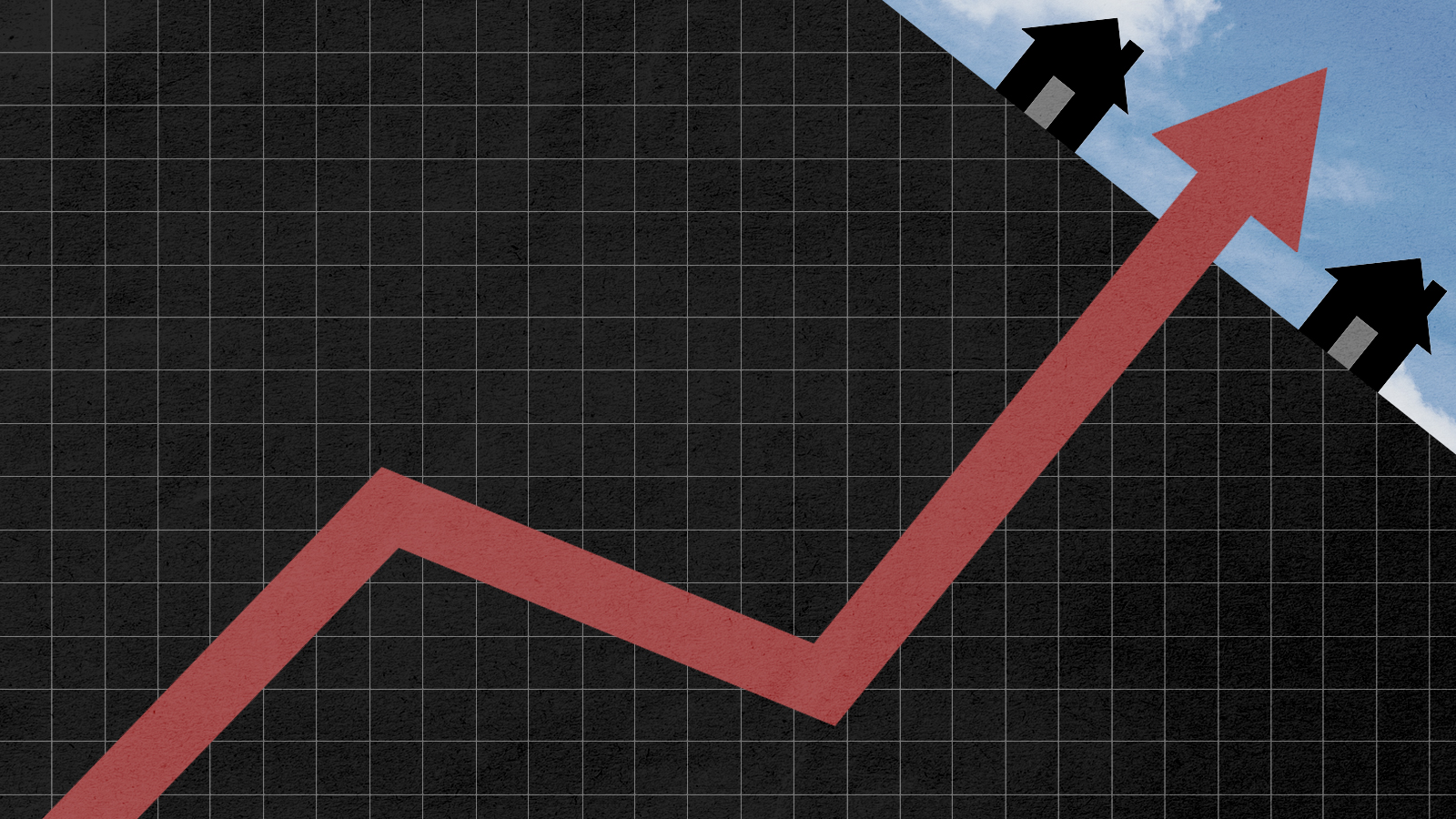Biden's stagflation is another blow to millennials
Younger adults fall one step further from the American dream


A free daily email with the biggest news stories of the day – and the best features from TheWeek.com
You are now subscribed
Your newsletter sign-up was successful
You know the bad news about the economy. GDP declined by 1.4% in the first quarter of 2022. Inflation stands at the highest level in four decades, with gas prices leading the way. Stock markets are at their lowest ebb since the dark days of the pandemic.
So it's not very surprising that Americans are gloomy about their prospects. According to a Morning Consult poll released on Tuesday, just 26 percent of the public believe they are securing their financial futures. Recent consumer confidence numbers also show anxiety, if not outright panic.
Could there be a silver lining to these looming clouds? Desperate for good news, the administration and its supporters have emphasized a few positive trends. For one thing, unemployment is way down. For another, surging house prices have buoyed the finances of the people who own them.
The Week
Escape your echo chamber. Get the facts behind the news, plus analysis from multiple perspectives.

Sign up for The Week's Free Newsletters
From our morning news briefing to a weekly Good News Newsletter, get the best of The Week delivered directly to your inbox.
From our morning news briefing to a weekly Good News Newsletter, get the best of The Week delivered directly to your inbox.
Some of these talking points are hot air. For all the talk of rising wages and tight labor markets, inflation is eating up nominal raises. Reduced real wages may also constrain labor market participation, which dipped slightly in April after several months of increases.
Booming Zillow estimates are exciting for homeowners. As the journalist Benjy Sarlin observed on Twitter, though, they can't realize much of their theoretical wealth until they sell — and likely apply the proceeds to a new housing purchase in the same pumped up market. Unless they own multiple residences or plan to significantly downsize or move to a much cheaper area, they're probably not as well off as they think.
Still, there's an element of truth in defenses of the Biden economy. If you own a house, have a fixed-rate mortgage, and have significant investments that you don't need to cash in immediately, you're probably doing okay. And households with higher incomes have more of a cushion against rising consumer prices. Those advantages are reflected in the Morning Consult poll, where Baby Boomers and high earners are more likely to report a good financial condition than younger and poorer respondents.
But that's just another way of restating the generational problem with American political economy. The promise of reasonable comfort has mostly been realized for those who started careers, started 401Ks, and bought real estate before the 2008 financial crisis. For many of their children and younger siblings, though, goals once regarded as inevitable results of a college education seem like unattainable luxuries.
A free daily email with the biggest news stories of the day – and the best features from TheWeek.com
It's easy to dismiss challenges facing the overeducated and underemployed as the whining of the already privileged. After all, the majority of younger Americans without BAs have it far worse by any conceivable measure. That's why demands for blanket cancellation of student loans are so tonedeaf. According to most economists, these proposals offer the greatest benefit to debtors with the highest potential earnings, including those who pursued graduate degrees in law, medicine, and other professions.
Even so, there's genuine reason for concern. Although scholars dispute the relation among causes, the explosion of inescapable costs for housing, health care and higher education, even before the recent general inflation, likely contribute to the collapsing birth rate. In the long term, lower birthrates mean fewer workers relative to retirees. Old people vote, so cuts to social security and other programs that help the aged are unlikely to succeed. That means younger generations will likely have to pay higher taxes, adding to their financial burdens and further suppressing family formation. Americans under 40 or so aren't wrong to think the future looks bleak.
The expectation of downward mobility has political consequences, too. In different ways, employee-driven wokeness, the revival of organized labor among educated workers, and current iteration of the New Right are movements of relatively young people who don't see a place for themselves in an economic, cultural, and sexual order established largely by their Baby Boomer parents and grandparents. Despite their ideological differences, these movements share a temperamental opposition to the status quo that's not entirely explained by youth. You can't expect deference or gratitude from people who don't expect any rewards for their loyalty.
If you're inclined to optimism, you can make an argument that the shift to work from home will reduce some of these pressures. If it's too expensive to live in San Francisco or Washington, after all, video conferences and email make it possible to live somewhere less expensive — and very likely more pleasant. Less concentration of wealth and opportunity in big cities might also reduce geographic polarization. Refugees from California or New York might turn some red states a bit more purple. But the lower cost of living, better chances for property ownership, and corresponding advantages for having and raising children might also convert them to some of the views and virtues conservatives prize.
There's reason to doubt the optimistic scenario, though. One is that housing prices are going up in historically affordable regions as well as the usual coastal cities. Another problem is that work from home works best for relatively senior employees. As Megan McCardle argues in The Washington Post, younger workers are likely to have trouble learning their jobs and establishing professional networks on Zoom. And there's a heightened risk that already remote positions could be outsourced to workers even farther away–from, say, Florida to Bangladesh. Industrial workers learned how that works out long ago.
In the last third of the 20th century, a youth revolt transformed America. In culture, politics, and economics, it's still the Boomers' world. The rest of us are just living in it. I don't know what it would take to shuffle the deck again. But the postpandemic economy brings us closer to a reckoning.
Samuel Goldman is a national correspondent at TheWeek.com. He is also an associate professor of political science at George Washington University, where he is executive director of the John L. Loeb, Jr. Institute for Religious Freedom and director of the Politics & Values Program. He received his Ph.D. from Harvard and was a postdoctoral fellow in Religion, Ethics, & Politics at Princeton University. His books include God's Country: Christian Zionism in America (University of Pennsylvania Press, 2018) and After Nationalism (University of Pennsylvania Press, 2021). In addition to academic research, Goldman's writing has appeared in The New York Times, The Wall Street Journal, and many other publications.
-
 Sepsis ‘breakthrough’: the world’s first targeted treatment?
Sepsis ‘breakthrough’: the world’s first targeted treatment?The Explainer New drug could reverse effects of sepsis, rather than trying to treat infection with antibiotics
-
 James Van Der Beek obituary: fresh-faced Dawson’s Creek star
James Van Der Beek obituary: fresh-faced Dawson’s Creek starIn The Spotlight Van Der Beek fronted one of the most successful teen dramas of the 90s – but his Dawson fame proved a double-edged sword
-
 Is Andrew’s arrest the end for the monarchy?
Is Andrew’s arrest the end for the monarchy?Today's Big Question The King has distanced the royal family from his disgraced brother but critics claim a ‘fit of revolutionary disgust’ could still wipe them out
-
 The ‘mad king’: has Trump finally lost it?
The ‘mad king’: has Trump finally lost it?Talking Point Rambling speeches, wind turbine obsession, and an ‘unhinged’ letter to Norway’s prime minister have caused concern whether the rest of his term is ‘sustainable’
-
 The billionaires’ wealth tax: a catastrophe for California?
The billionaires’ wealth tax: a catastrophe for California?Talking Point Peter Thiel and Larry Page preparing to change state residency
-
 Bari Weiss’ ‘60 Minutes’ scandal is about more than one report
Bari Weiss’ ‘60 Minutes’ scandal is about more than one reportIN THE SPOTLIGHT By blocking an approved segment on a controversial prison holding US deportees in El Salvador, the editor-in-chief of CBS News has become the main story
-
 Memo signals Trump review of 233k refugees
Memo signals Trump review of 233k refugeesSpeed Read The memo also ordered all green card applications for the refugees to be halted
-
 Has Zohran Mamdani shown the Democrats how to win again?
Has Zohran Mamdani shown the Democrats how to win again?Today’s Big Question New York City mayoral election touted as victory for left-wing populists but moderate centrist wins elsewhere present more complex path for Democratic Party
-
 Millions turn out for anti-Trump ‘No Kings’ rallies
Millions turn out for anti-Trump ‘No Kings’ ralliesSpeed Read An estimated 7 million people participated, 2 million more than at the first ‘No Kings’ protest in June
-
 Democrats: Harris and Biden’s blame game
Democrats: Harris and Biden’s blame gameFeature Kamala Harris’ new memoir reveals frustrations over Biden’s reelection bid and her time as vice president
-
 ‘We must empower young athletes with the knowledge to stay safe’
‘We must empower young athletes with the knowledge to stay safe’Instant Opinion Opinion, comment and editorials of the day
